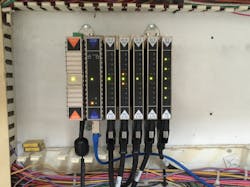Control System Upgrade Helps Arkansas Water Utility Improve Cybersecurity
City Corporation, the water and wastewater utility in Russellville, Ark., was controlling its pumps and other systems with obsolete PLCs. “So when one of them failed, we wanted to replace it with something that would provide a path to the future,” said Steve Mallett Jr., general manager of City Corporation.
The utility replaced the legacy PLC with an industrial control system from Bedrock Automation. Brown Engineers, a Little Rock-based integrator, completed the upgrade to a new level of cybersecurity and performance. Bedrock’s military-grade secure operating system further embeds security into the software and firmware used to control the facility, which, like other municipal utilities, faces a growing threat of cyber attacks.
Brown Engineers made the upgrade in November, and City Corporation remains happy with its decision to make the switch, Mallett said. “With its high performance and increasingly important built-in cybersecurity protection, the Bedrock system offers [a path to the future], and it has been running without issue since installed,” he said. “We are very pleased with the decision to go with Bedrock.”
Though performing essentially the same function as the legacy PLC, the Bedrock system is significantly different from the legacy PLC. Instead of a traditional pin-based backplane, it uses an electromagnetic backplane that eliminates pin corrosion and breakage, improving long-term reliability and enabling embedded security by preventing the possibility of using counterfeit I/O modules. It also creates a galvanic isolation barrier between field wiring and the controller, and provides a high-performance, deterministic I/O update rate to support current functionality and additional planned expansions.
Unlike the legacy PLCs, the Bedrock system can operate at 90-260 VAC or DC power without fans or DIP switches for simplicity and robustness. It embeds standard, open-system technologies, including OPC UA, a fully compliant IEC61131-3 programming environment, and standard Ethernet support at the control and I/O networks.
The control system consists of only a dozen part numbers, reducing installation and maintenance costs. It can be scaled to add more advanced control functions, such as serving as a SCADA remote transfer unit (RTU) or distributed control system (DCS).
“We are seeing increased interest in cybersecurity among municipal utility clients such as City Corporation,” said Dee Brown, co-founder of Brown Engineers and principal in charge of the upgrade. “Many want to control security functions from their tablets and control centers because their networks are getting hammered every day by probes and attempted intrusions. The Bedrock controller gives them another layer of protection beyond firewalls and VPNs. It is unique in that as it powers up, it checks to be sure that all hardware and software components are validated. Regular PLCs just can’t do that.”
The Bedrock controller is part of an integrated plantwide SCADA system. Users connect to that system via Ignition, an industrial applications platform from Inductive Automation that coordinates control and data acquisition for all plant PLCs and RTUs.
“We are pleased to be working with Brown Engineers, Inductive Automation and the City of Russellville in bringing about what we believe will be a new generation of municipal infrastructure automation, the benefits of which will accrue to city residents in quality and cost-efficiency of service,” said Bob Honor, president of Bedrock Automation.
About the Author
Aaron Hand
Editor-in-Chief, ProFood World

Leaders relevant to this article:
